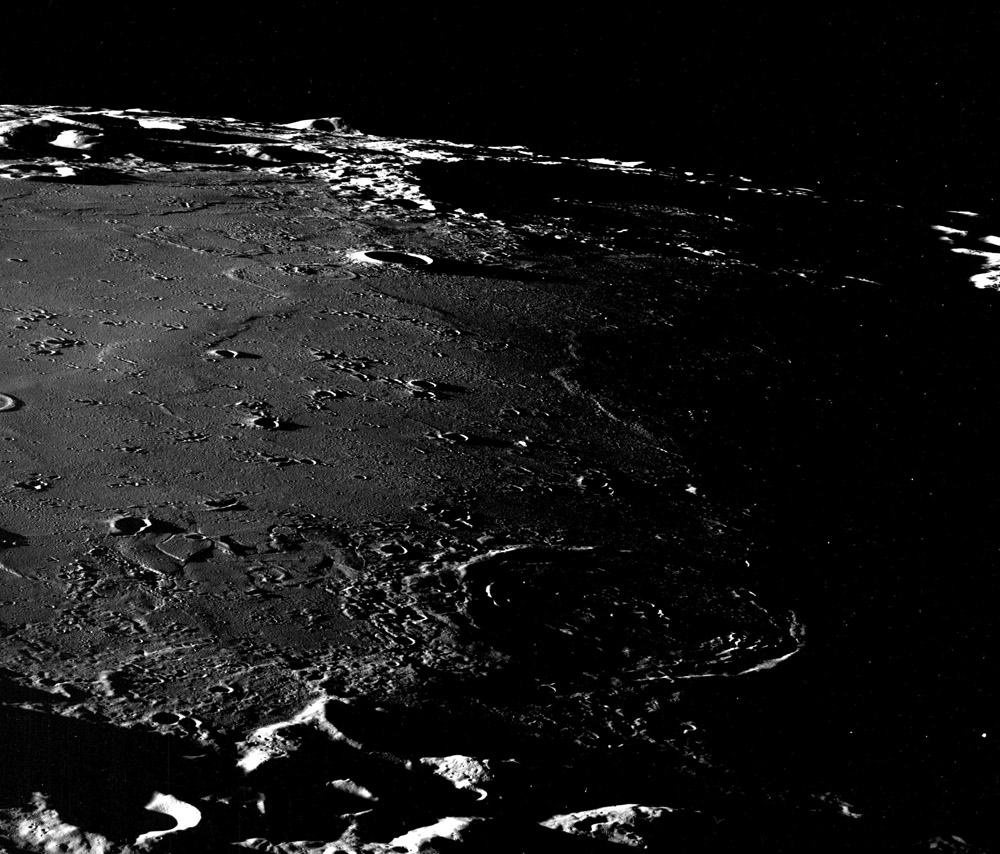Difference between revisions of "February 17, 2009"
| Line 1: | Line 1: | ||
__NOTOC__ | __NOTOC__ | ||
=New Data From Old Pics= | =New Data From Old Pics= | ||
| − | |||
<!-- ws:start:WikiTextHeadingRule:2:<h1> --> | <!-- ws:start:WikiTextHeadingRule:2:<h1> --> | ||
<!-- ws:start:WikiTextLocalImageRule:8:<img src="/file/view/LPOD-Feb17-09.jpg/58174946/LPOD-Feb17-09.jpg" alt="" title="" style="width: 900px;" /> -->[[File:LPOD-Feb17-09.jpg|LPOD-Feb17-09.jpg]]<!-- ws:end:WikiTextLocalImageRule:8 --><br /> | <!-- ws:start:WikiTextLocalImageRule:8:<img src="/file/view/LPOD-Feb17-09.jpg/58174946/LPOD-Feb17-09.jpg" alt="" title="" style="width: 900px;" /> -->[[File:LPOD-Feb17-09.jpg|LPOD-Feb17-09.jpg]]<!-- ws:end:WikiTextLocalImageRule:8 --><br /> | ||
| − | <em>Apollo 8-13-2243 south up image from [http://history.nasa.gov/ap08fj/photo13-e.htm Image Science and Analysis Laboratory, NASA-Johnson Space Center], by way of the Apollo Flight Journal</em><br /> | + | <em>Apollo 8-13-2243 south up image from [http://history.nasa.gov/ap08fj/photo13-e.htm" rel="nofollow Image Science and Analysis Laboratory, NASA-Johnson Space Center], by way of the Apollo Flight Journal</em><br /> |
<br /> | <br /> | ||
| − | Danny Caes, the intrepid explorer of ancient lunar spacecraft images, has found this remarkable and unfamiliar view from Apollo 8. Danny identifies the large crater whose rim is illuminated at lower right as Daguerre and the bigger crater at upper right with a large curved rim shadow as Fracastorius. You can use the Lunar Orbiter IV [http://www.lpi.usra.edu/resources/lunar_orbiter/images/img/iv_072_h2.jpg image] to confirm Danny's interpretation by crater-hopping across Mare Nectaris. The odd structure in the mare just left of Daguerre was already depicted in Wes Higgins' [http://www.lpod.org/archive/LPOD-2004-10-23.htm image]. The mare ridges in Nectaris are not seen better than this anywhere, showing more complexity than previously known; all mare will be discovered to be more interesting as we get high res, low Sun views. Danny rightly points out the remarkable mountain on the horizon and surmises, probably correctly, that it is a peak at 38°E and 29°S, shown on Rükl's <em>Atlas of the Moon</em> plate 58. This peak is the continuation of the Altai Scarp basin rim. <br /> | + | Danny Caes, the intrepid explorer of ancient lunar spacecraft images, has found this remarkable and unfamiliar view from Apollo 8. Danny identifies the large crater whose rim is illuminated at lower right as Daguerre and the bigger crater at upper right with a large curved rim shadow as Fracastorius. You can use the Lunar Orbiter IV [http://www.lpi.usra.edu/resources/lunar_orbiter/images/img/iv_072_h2.jpg" rel="nofollow image] to confirm Danny's interpretation by crater-hopping across Mare Nectaris. The odd structure in the mare just left of Daguerre was already depicted in Wes Higgins' [http://www.lpod.org/archive/LPOD-2004-10-23.htm" rel="nofollow image]. The mare ridges in Nectaris are not seen better than this anywhere, showing more complexity than previously known; all mare will be discovered to be more interesting as we get high res, low Sun views. Danny rightly points out the remarkable mountain on the horizon and surmises, probably correctly, that it is a peak at 38°E and 29°S, shown on Rükl's <em>Atlas of the Moon</em> plate 58. This peak is the continuation of the Altai Scarp basin rim. <br /> |
<br /> | <br /> | ||
| − | <em>[mailto:tychocrater@yahoo.com Chuck Wood]</em><br /> | + | <em>[mailto:tychocrater@yahoo.com" rel="nofollow Chuck Wood]</em><br /> |
<br /> | <br /> | ||
<strong>Related Links</strong><br /> | <strong>Related Links</strong><br /> | ||
Revision as of 19:04, 4 January 2015
New Data From Old Pics

Apollo 8-13-2243 south up image from " rel="nofollow Image Science and Analysis Laboratory, NASA-Johnson Space Center, by way of the Apollo Flight Journal
Danny Caes, the intrepid explorer of ancient lunar spacecraft images, has found this remarkable and unfamiliar view from Apollo 8. Danny identifies the large crater whose rim is illuminated at lower right as Daguerre and the bigger crater at upper right with a large curved rim shadow as Fracastorius. You can use the Lunar Orbiter IV " rel="nofollow image to confirm Danny's interpretation by crater-hopping across Mare Nectaris. The odd structure in the mare just left of Daguerre was already depicted in Wes Higgins' " rel="nofollow image. The mare ridges in Nectaris are not seen better than this anywhere, showing more complexity than previously known; all mare will be discovered to be more interesting as we get high res, low Sun views. Danny rightly points out the remarkable mountain on the horizon and surmises, probably correctly, that it is a peak at 38°E and 29°S, shown on Rükl's Atlas of the Moon plate 58. This peak is the continuation of the Altai Scarp basin rim.
" rel="nofollow Chuck Wood
Related Links
Rükl plates 47 & 58



